Announcements
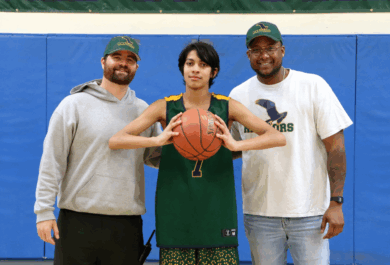
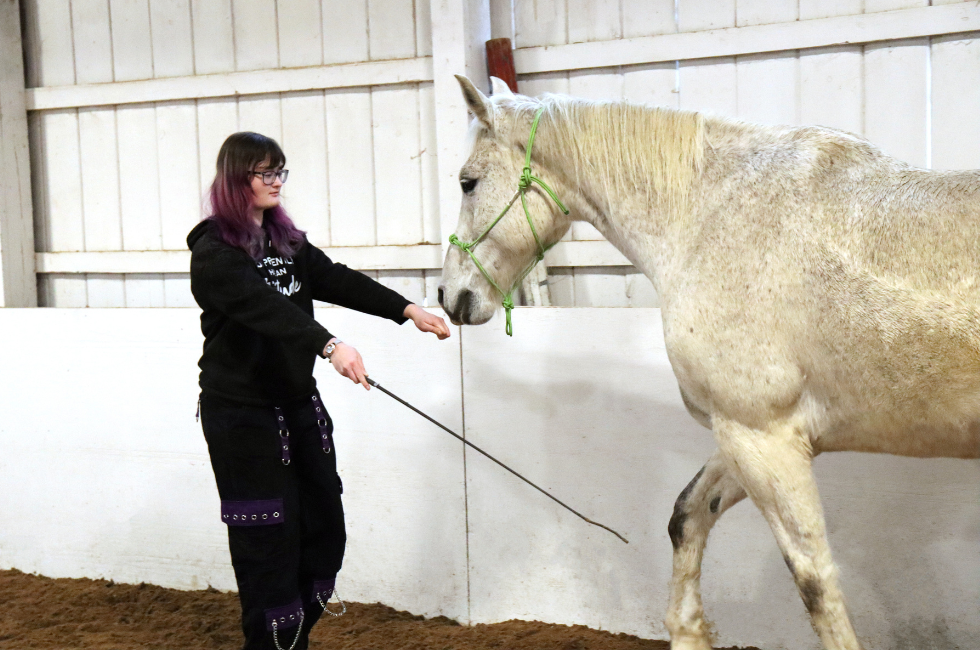
Recent transition to groundwork-only equine activities has created new opportunities in animal-assisted education with an enhanced view of animal welfare. As a Certified Therapeutic Riding Instructor and Equine Specialist in Mental Health and Learning, Valerie Castracucco brings valuable insight to her role as Equine Program Teacher.
Our program is entirely ground-based, which means we focus on interactions with horses without riding them. We practice Equine-Assisted Learning (EAL), an experiential approach where students develop social-emotional skills and personal growth through meaningful interactions with the horses. Students connect these skills through basic care, handling and training, and learning to understand horse behavior and how it relates to human social circles.
Students gain a wide range of useful skills, from procedural tasks to more perception-based activities. Fundamental skills include proper horse care and clear communication techniques. When you’re working with an animal that weighs over 1,000 pounds, understanding body language is incredibly important!
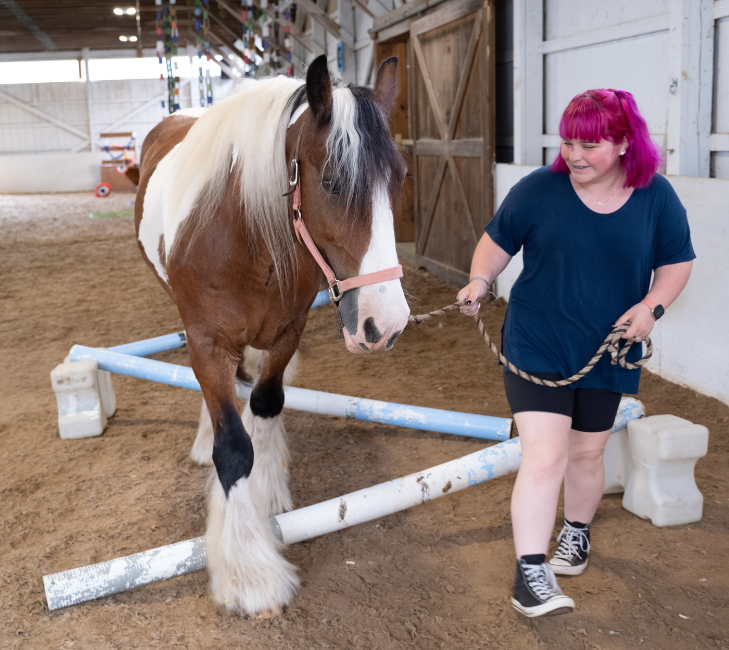
Students engage in activities such as grooming, leading, lunging, ground driving, liberty training, and longlining. They assist staff in keeping the horses mentally and physically fit through varied training exercises, and desensitizing them to our active campus. Students also have the opportunity to learn about equine nutrition, anatomy, and physiology through caretaking tasks; and education-focused activities, such as art projects and herd observation, facilitate participation for those with a lower degree of comfort.
Students practice communication skills and build on empathy by recognizing the needs of the animals, and their role in the horses’ care and well-being. They also learn to develop observation skills by reading their horse’s body language, and identifying signs of relaxation or stress to better respond to the horse’s needs.
We’ve noticed such positive changes in our horses. Without the pressure of carrying riders—particularly beginners, who can be more challenging, or even frustrating for a horse to accommodate—they seem more relaxed and freer to express their unique personalities. The barn atmosphere is noticeably calmer without the rush of preparing tack for riding lessons.
This revised groundwork approach also allows us to welcome horses of all ages and abilities, including those with special needs who might struggle in a traditional riding program. We recently took in a horse and two donkeys from two local horse rescues. The physical demands of a riding program makes many rescued horses unsuitable but now we can focus on all the other aspects that make them good partners for our students!
Students recognize that these horses still have great value by being able to empathize with their situations, and be a part of the healing process. Our equine team can provide specialized support while giving students hands-on experience with equine medical treatment, such as regular laser therapy or wraps. The concept that not having a certain ability does not equate to an inability to make a meaningful contribution is a strong, transferable example to students.
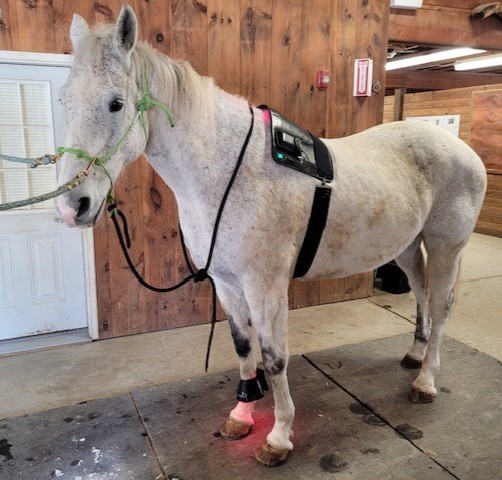
It really comes down to quality time and trust. Without the need to focus on riding mechanics, students can concentrate on the horse’s cues during their classes. They experience things in the present moment, just as horses do. Groundwork also makes the program more inclusive. Students who are physically unable to participate in riding can fully engage, and hesitant students can be met where they are.
Our herd ranges from 34-inch-tall mini horse Cricket to Danny, a 19-hand-tall Clydesdale, so students can partner with animals of a size that matches their comfort level. Many eventually feel comfortable graduating to work with larger horses, or form a deep and meaningful bond with their current partner.
For a student, the relationship fosters growth, confidence and compassion that extends far beyond the barn, while it builds trust and enriches life for the horse. We are already seeing the impact as humans and horses make gains—all without anyone climbing into a saddle. Learn more about Green Chimneys’ therapeutic equine education and activities
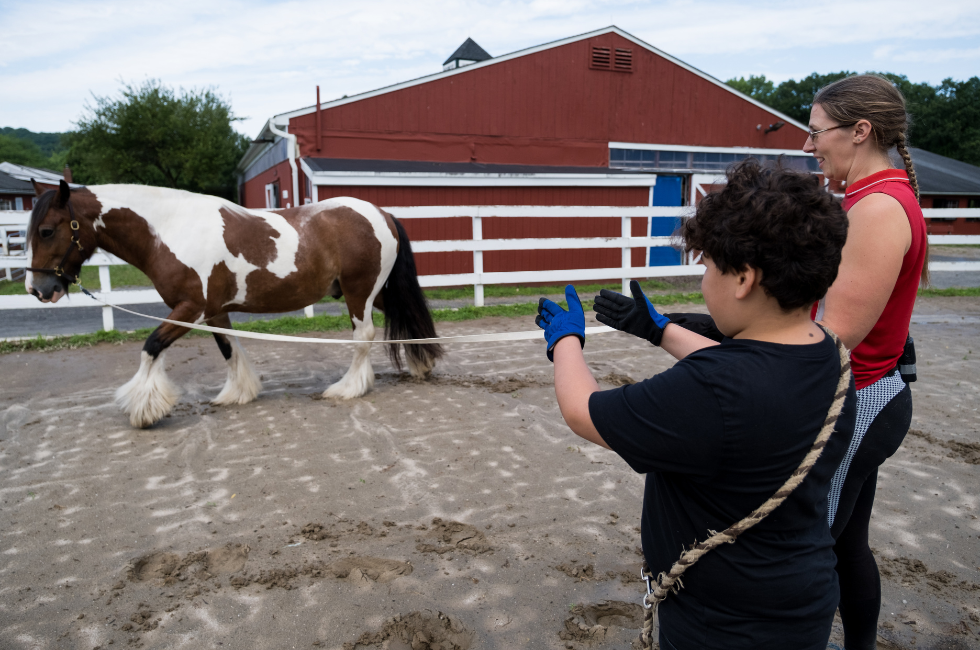

Crowned the best for falconry in medieval times, 环球体育 were once reserved for kings. As the largest falcon in the world, with exquisite plumage ranging from bright white to deep charcoal, gyrs are revered for their powerful skill of flight. Their long wings make hunting waterfowl from 3,000-feet-high a feasible and fantastical feat. This falcon was flown in the sport of falconry for several years.